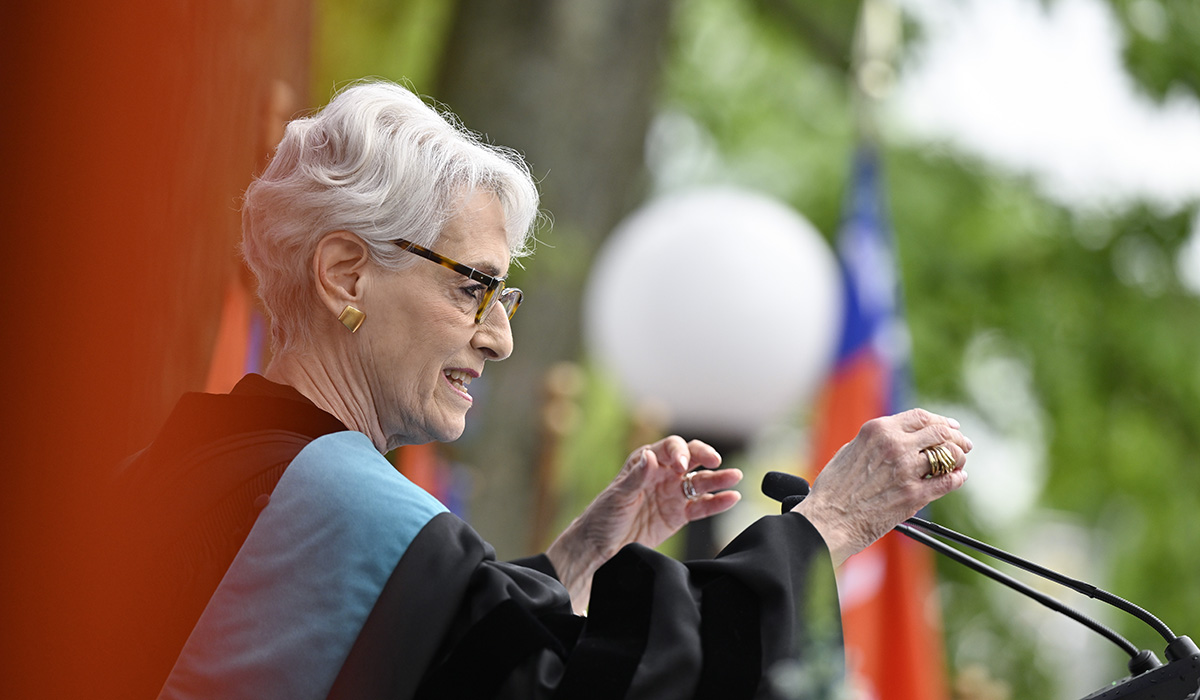
May 13, 2023
Wendy R. Sherman, U.S. Deputy Secretary of State
Gettysburg College
Gettysburg, Pennsylvania
As delivered.
President Iuliano, members of the board of trustees, faculty and staff, families and friends—and to the graduates of Gettysburg College: it is an honor to be here to say congratulations to the Class of 2023.
You’re going to hear some familiar themes today.
So let me begin with a massive understatement: you’ve had one eventful undergraduate experience.
You spent the better part of your first and second years on Zoom. You lived in the heart of a swing state in the midst of a somewhat contentious election. You came up with a new section in the Gettysburgian on the fly, appropriately dubbed “Great Work from Home.”
And that’s before we talk about Taylor Swift crashing a ticket website and spurring congressional hearings.
Nearly nothing about the world—nothing—is the same today as when you first walked through the doors of Penn Hall in 2019.
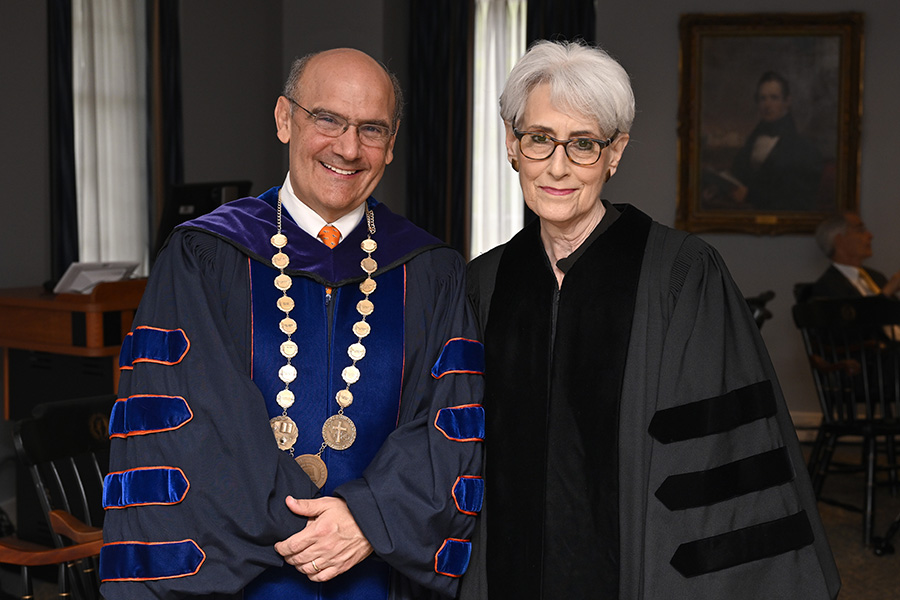
That reality brings with it both fear and hope, worry and possibility, a blank canvas that looks daunting to paint—or for some of you, I hope all of you, exhilarating to fill in.
That uncertainty might feel overwhelming. But in a lot of ways, you’re in very good company. Because in each generation, how events will transpire; what moments and movements will change the world; who will rewrite the history books—none of it is preordained.
Even developments that seem obvious or inevitable in retrospect were unknown or unknowable at the time. How it all unfolds tends to depend on the decisions of young people like you—on the leadership of those willing to bend the arc of the future toward something better, fairer, and more just.
Consider some examples from these storied grounds:
When a graduating senior named Carol Bellamy sat where you do sixty years ago, few knew she would leave her mark as the first woman to hold citywide office in New York, or as Executive Director of UNICEF, or as the first Peace Corps volunteer to serve as the Peace Corps Director.
When the military set up Camp Colt here to train tank commanders in World War I, few knew that one of those officers—a young Dwight Eisenhower—would rise to the rank of five-star general and help save Europe and the world from fascism and Nazism.
When Abraham Lincoln spoke on this field of a new birth of freedom, and a government of, by, and for the people—thereby making it impossible for anyone else to give a memorable speech in Gettysburg—few knew that his brief oration, so short, would redefine our country’s purpose and renew the meaning of our nation’s creed.
No matter how straightforward it might look in the pages of history, none of this was scripted or set in stone. Now, in an age when information can move, shift, and accelerate at breakneck speeds, knowing what to expect or who will lead is even more unpredictable.
This class appreciates that uncertain path better than maybe any other in recent history. Because it’s been the calling card of the last four years.
When you started at Gettysburg College, as the President and as your wonderful Anna Benson said, COVID wasn’t part of the lexicon, but it quickly became the central part of our lives.
When you first arrived onto this campus, ChatGPT wasn’t a speck on the digital radar, but technologies like it are fast-emerging as hallmarks of our jobs, our careers, and our lives.
When you took that traditional walk through town, in the rain, during your first week as part of this class, a massive land war in Europe seemed unthinkable. But it suddenly and brutally became real as Russia invaded Ukraine, defied global norms, and challenged all of us to stand united for our values at home and abroad.
When you see so many earth-shattering headlines filling our newsfeeds, it can feel, to borrow a phrase from Hamilton, like “the world’s turned upside down.” It can seem like the only constant is constant change.
Whether that’s a source of immense trepidation or abundant opportunity is for you to determine.
Again, you’re not the first class, nor will you be the last, to face a life and a planet more defined by change than certainty.
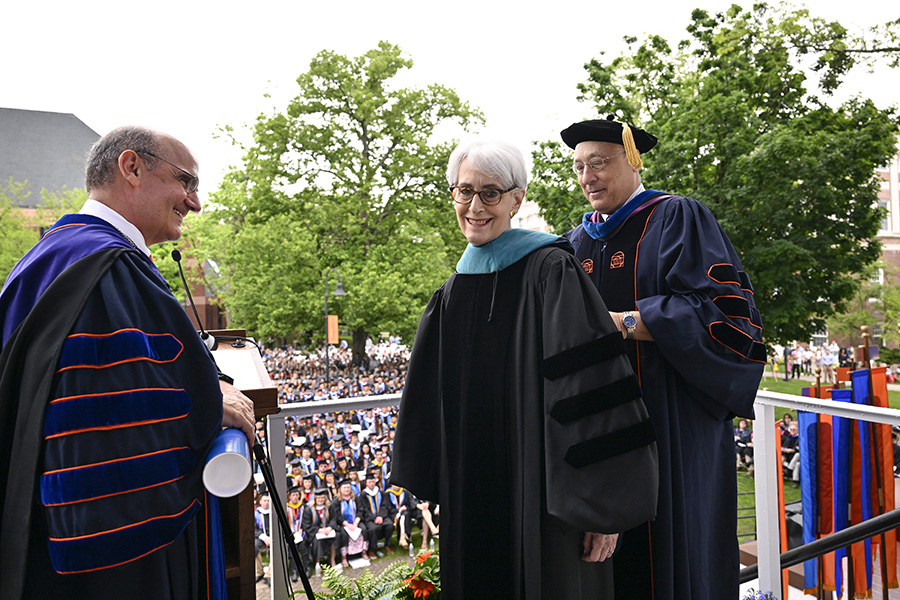
Many of us—your parents and grandparents, aunts and uncles, teachers and professors—confronted our own tectonic shifts. Many of us, not me in particular, but many of us made five or ten-year plans, then tossed them aside as new opportunities popped up. Many of us entered a world on graduation day that would be unrecognizable a few years later.
That’s certainly been the case for me.
At my commencement, I was preparing for a new job and a career in social work and child welfare—and the dominant international news story was the Vietnam War.
By the next decade, I was managing a Senate campaign and working on Capitol Hill—and the main force in global affairs was the persistence of the Cold War.
By the 1990s, I took my first role at the State Department, as we were asking ourselves how the world might look after the Cold War.
Our gaze would turn to counterterrorism and the Middle East in the wake of 9/11. My daughter’s class was then branded as the “9/11 class.”
Then I found myself back in government as the lead negotiator on the Iran nuclear deal in the 2010s. And today, as the first female Deputy Secretary of State, focusing on China, the Indo-Pacific, Ukraine, tech, and crafting a more inclusive foreign policy.
The point is: your forebears dealt with a whole lot of change as well. We had to adjust and adapt with each twist and turn. We had to hold fast to our core principles then apply them to evolving contexts and circumstances.
Put another way: you’re not alone in facing a society, a country, and a world that is rife with volatility.
But here’s a key difference: it’s no longer up to me and my generation to figure out what comes next. We’re passing the baton to you and your generation to lean into that unpredictability.
It’s up to you to take the reins of leadership in business and politics, engineering and academia, science and sports, diplomacy and beyond—and steer us in the direction of progress.
It’s up to you to swiftly and creatively tackle the great challenges before us: How we preserve our planet in the face of the climate crisis. How we manage the risks and maximize the benefits of disruptive technologies. How we emerge from COVID better prepared for the next pandemic.
How we defend our safety and our ideals in the age of cyberattacks, competition from Russia and China, threats from North Korea and Iran. And how, how above all else, we strengthen democracy, so everyone—everyone—has a place in its present, everyone has a stake in its future, and everyone belongs.
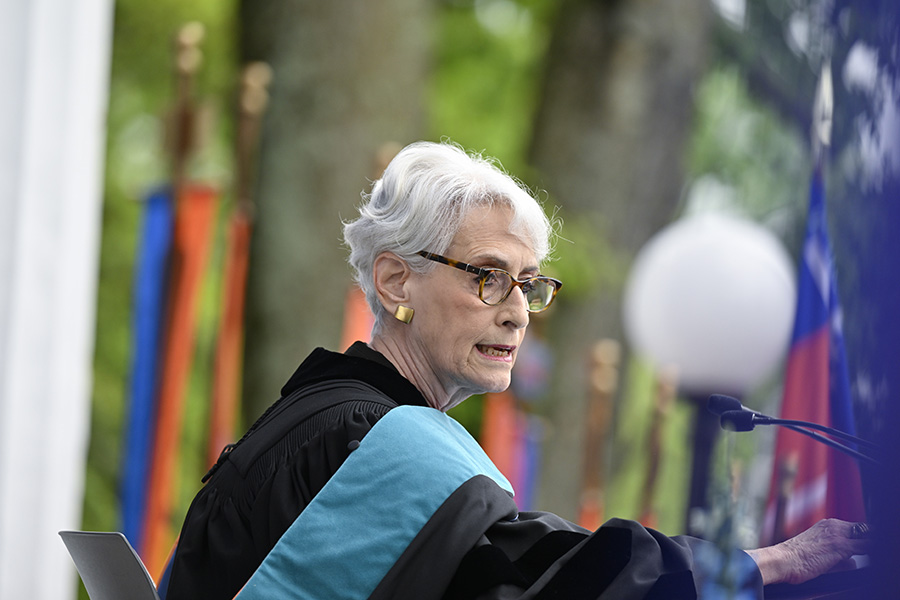
Nothing here can be addressed by any one person or politician or sector or industry. It will require us to find common ground with peers and colleagues. And frankly, that’s getting harder too.
We inhabit a fast-changing world defined by path-breaking technologies that empower us to connect with counterparts on the other side of the planet, yet distance ourselves from someone just next door.
These platforms allow us to read the news we want, listen to the podcasts we like, access information we prefer, even if our neighbors occupy a completely different silo.
Whether it involves tablets or smart phones, Zoom or the metaverse, such remarkable and rapid revolutions in technology bring a lot of good to our lives, our society, and our economy.
But they add another degree of complexity and instability. They add another source of divisiveness and disruption. They add another layer of questions with few, if any, clear answers.
Still, even in the face of so much unpredictability, you should leave here with confidence: confidence in yourselves and your classmates. Confidence in your character and knowledge. Confidence in what this school has taught you and how you’ve grown along the way.
Take confidence out of the facts of what you’ve already endured. Simply put, Class of 2023: you made it. You’ve managed through the madness of the last four years. You survived something truly unprecedented, and you reached this graduation day.
You’ve wound through a journey in experiential education that is the hallmark of this college. You’ve gone on service learning trips and study abroad. You’ve worked with farms in Central Pennsylvania and traveled with the Eisenhower Institute to D.C. You’ve learned through classwork and field work.
All of that has given you the key skills needed to take on whatever lies ahead: resilience and resourcefulness; an open mind and a capacity to think forward; the ability to adapt and the strength to power through the toughest of times.
All of this has prepared you for a future that’s going to be more global, more fast-paced, and more interconnected than ever before.
So have confidence in what this degree means beyond the tests and grades and reading assignments. And take heart from another lesson gleaned on this campus, in this era of technological leaps and incredible unknowns: that here at Gettysburg College, as part of a class forced to spend too much time socially distanced, you appreciate the value of the personal and the direct.
You recognize what’s gained when you can talk with a classmate in a dorm room late into the night—and what’s lost when you can only do that on a screen.
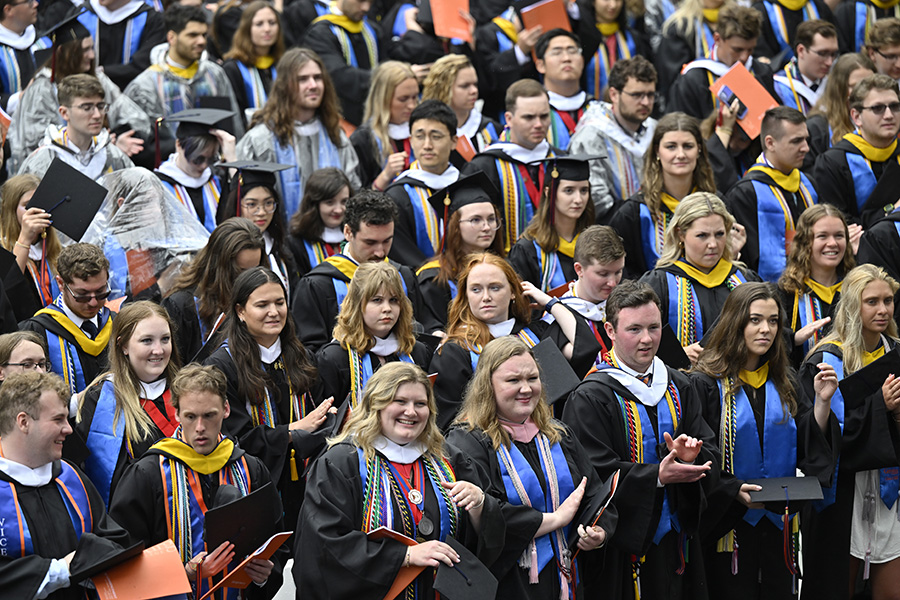
Just like the skills garnered from your educational experience, you understand what lifelong qualities grow out of those one-on-one moments: empathy; compassion; patience; respect.
That shone through when some members of this class were asked what it meant to be a Gettysburgian. Their answers didn’t focus on hot-button issues on campus or big-picture events like the pandemic or the election.
Their responses spoke to something more fundamental:
Gaining the “knowledge and skills to do good in the world…”
“Being surrounded by other intelligent and hard-working classmates…”
Building curiosity and critical thinking…
Participating in a “community that strives for excellence in learning, growth, and positive impact.”
Imbued through it all are lessons that apply in diplomacy, public service, or any career path—lessons I hope can ground you on the next legs of your journey—reminders that, in school and family and life:
Your fellow human beings matter.
Relationships matter.
Community matters.
Kindness matters.
Connections—with people around you, with coworkers and neighbors, with close friends, family, and complete strangers—they matter too.
For all the change around us, for all the unknowns, for all the uncertainty wrought by world events and emerging innovations, take that core foundation shaped here at Gettysburg—take the friendships built, the values solidified, the perspectives gained—into everything you do.
Because it’s on that foundation that you’ll be equipped to solve the tallest tasks of this generation, and the next.
It’s with those building blocks beneath your feet and that diploma in your hands that you’ll be ready to face the unpredictability of tomorrow with courage, confidence, and hope.
Then decades from now, your successors will be able to point to this class as the one that embraced the uncertainty before them and assumed responsibility for the unfinished work of creating a future of strength, prosperity, peace, inclusiveness, and possibility.
Thank you, Class of ’23, for the opportunity to be a part of this day. And congratulations to you.
View more coverage of the Class of 2023 Commencement Ceremony.
Photos by Jason Minick and Casey Martin Photography
Posted: 05/16/23